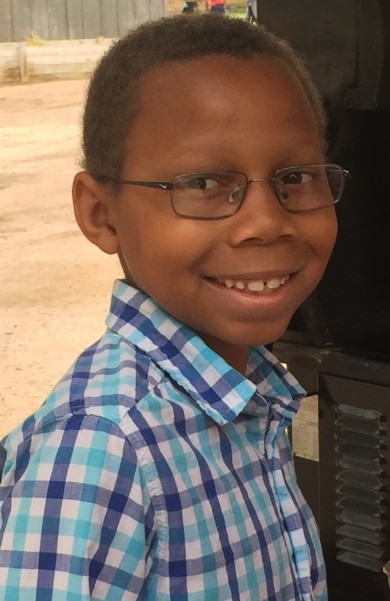The Key to Happiness
 My son has a form of sickle cell anemia that has caused him great pain and suffering throughout his life. It often impedes his physical abilities, sidelining him for important events and milestones other children seamlessly enjoy. This past year has been particularly difficult for him due to an uptick in the frequency of his pain crises. This has been heartbreaking, but at a very young age my son has learned a profound lesson that I truly believe is the key to happiness. He is in tune with the value of his wellness, and when he is well, he rests in a space of gratitude.
My son has a form of sickle cell anemia that has caused him great pain and suffering throughout his life. It often impedes his physical abilities, sidelining him for important events and milestones other children seamlessly enjoy. This past year has been particularly difficult for him due to an uptick in the frequency of his pain crises. This has been heartbreaking, but at a very young age my son has learned a profound lesson that I truly believe is the key to happiness. He is in tune with the value of his wellness, and when he is well, he rests in a space of gratitude.
Two months ago he came home from school and said, “I felt great today mom! Playing for a long time did not make me tired. And I wasn’t in pain,” and the two of us gave hugs and high fives. However, I knew how this differentiated him from other children. Other children are able to take their good health for granted. My son’s gift in the midst of his struggles lies in the fact that he is not in a position to take his good days for granted like the rest of us. The rest of us have good days all the time but don’t see them. We only see the anomalies that interrupt our basic sense of entitlement to health, wealth, and happiness.
Most of us want to be happy.
I don’t believe that human beings have an innate desire to be miserable, but it can sometimes appear that way. We have all seen people and probably have had the experience ourselves of not being happy despite an underlying awareness that we have every reason to be. So often it appears that someone may have their lives together. The person has a job, a roof over their heads, enough to eat, people who love them, but still experience chronic discontent. Sometimes the person suffers from depression. Most times discontent roots itself in something much simpler. The inability to stay in the present moment is the root.
William Ralphe Inge wrote, “Worry is the interest paid on trouble before it comes due.”
This is a great quote, but I’d like to add that the interest more often than not, is paid on trouble that never comes due.
Worry, stress, anxiety all come from processing events that have yet to happen, or reliving events that have occurred in the past. This is at the heart of our discontent and it is linked to physiological responses to everyday stresses that are not conducive to good health or peace of mind.
Findings suggest that the body can scarcely tell the difference between a current trauma and stress over an impending or previous trauma. This means that every time human beings stress about things that have not happened, the mind and body still expend the energy to protect itself as if it had. This is costly. The physical manifestation of this is a rise in cortisol, epinephrine, and other steroid hormones. Stress increases our heart rate, blood pressure, and processes needed for healing and tissue repair are temporarily halted[1].
Stress makes one more susceptible to disease and this comes from an increase in glucocorticoids in the body. Frequent rushes of these hormones damage the nervous system as well as have deleterious effects on the metabolism. Stress leads to weight gain, heart disease, and increased vulnerability to infectious diseases.
Interestingly, stress also makes us reactionary.
The hormones make us react as if being chased by lion. These were the primal conditions that our bodies adapted to for survival. In such an instance it is not in our best interest to think and ponder- we must simply react. Therefore, our faculties to examine a situation, adjust our approach, and make appropriate decisions are physiologically impaired during times of stress.
This is one of the ways OCD manifests. The person suffering from OCD knows that their behavior is illogical, but feels compelled to behave that way regardless. The stress hormones that are essentially attacking their nervous system make adjusting their behavior difficult. We’ve all had discussions with someone in the middle of a trying time who seemingly cannot take sound advice. They seem to reject all logic as they display an unreasonable attachment to an action or line of thought, frustrating all who try to help them. There is a physiological reason for this, and its basis is in our biological responses to stress.
“The core of psychological stress is loss of control and predictability (Sapolsky).”
This quote succinctly defines our experience. Therefore in order to mitigate the power our stress responses have over our psyches, it is necessary to surrender to the reality that we never had control to begin with, and that predictability is only a precursor for change.
Ultimately, for human beings not being chased by lions, real or imagined, stress signals one is not living in the present moment. The incessant sense of impending disaster is both physiologically and psychologically crippling. Taking Xanax or a vacation is not the solution to this. The solution to this is in living in the present moment. Being where you are.
No matter how stressful you believe your life to be, if you take a moment to suspend future or past oriented worry, you may find that at this exact moment, you want for nothing and can find happiness.
My son teaches me the profound lesson of happiness every day of his life.
He has learned to handle the unpredictable nature of his health with grace. And he now knows he can’t predict or control his illness, but he has learned to live in gratitude for every moment he is well.
He and I are both stripped of the well-worn shield of blame assigning that becomes the default setting for many of us in times of pain, anger, or sadness. There is no one to blame. This problem can’t be “fixed”. He has taught me the value of acceptance and self-forgiveness. There are times when I feel as though this is my fault or that I am not doing enough to help him, but I know logically that this isn’t true. It’s a feeling based in my innate desire to feel in control. My child. My baby. Has shown me the value of surrender and the illusion that is control.
Stop blaming yourself for everything.
Forgive yourself for your shortcomings and find happiness.
Live in the present and truly embrace, at this very moment, all that you love.
[1]Sapolsky, R. M. (2017). Behave.
This amazing article comes from Crystal’s Corner. Be sure to check out her blog at https://crystalmccrory.com for more fantastic articles!

